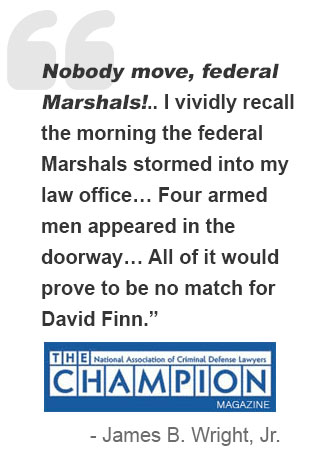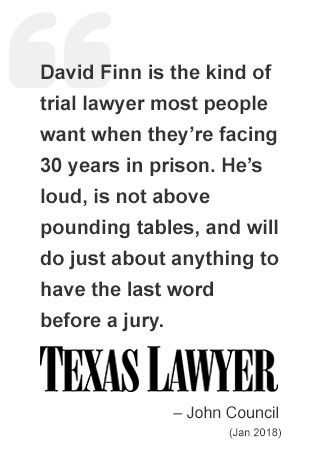


Dallas Observer-Glenna Whitley, April 2007
Wednesday, April 11, 2007
News
Blogs
Article By Glenna Whitley
Bully on the Bench
When big-city lawyers appear in the courtroom of Judge Gene Knize, they better be prepared to duck and cover.
By Glenna Whitley Published: April 12, 2007
The 120 dutiful souls who’d answered their jury summons on January 9 had been sitting in the historic Waxahachie courthouse listening to lawyers drone on for hours. Then suddenly things got weird.
The prosecutor had finished asking questions of potential jurors when David Finn stood up. The 43-year-old Dallas defense lawyer was representing truck driver Leon Williams in the court of state District Judge Gene Knize. The judge, an Ellis County fixture, likes to choose four or five juries in one day. Saves time and money.
Knize’s courtroom—ochre walls, rich wood paneling, tall windows, a long curving balcony and a soaring ceiling—is the embodiment of what comes to mind when great old films about American justice are mentioned. But the judge doesn’t quite fit the picture. Knize has long made it a policy to wear a suit instead of a black robe while occupying the bench. He doesn’t need one.
As his hawk-like face scans the courtroom, there’s no doubt who’s in charge.
At the defense table sat Williams, a black Air Force veteran accused of negligent homicide in a multi-vehicle crash in which two Ellis County residents had been killed. Though tests showed no drugs or alcohol in Williams’ system at the time of the wreck, he was indicted for criminally negligent homicide nine months later.
The state was alleging that he’d been “inattentive” or asleep when the accident occurred. Williams had rejected a plea bargain offered by prosecutors.
“As the judge said a little while ago, my name is David Finn and I’m 43,” the defense attorney said. “I live in Dallas, got four kids and a wife.”
Knize interrupted. “No biographies.” “But it’s my time, judge,” Finn said. He thought better and moved on.
As Finn asked questions, Jeffrey Spence, a diesel mechanic on the jury panel, could see a sneer develop on Knize’s face. Spence would later testify that the judge looked at Finn as if the defense attorney were “a neighbor’s dog” running loose in his yard, according to an account of the proceedings in the Waxahachie Daily Light.
To jury panelist Deborah Kuykendall, the tension seemed to be coming from the judge, not Finn. Knize hadn’t interrupted the prosecutor, but he kept stopping Finn to argue with him. It was like Knize “was establishing his dominance.”
Leon Williams was aghast. The judge was going after the man who stood between him and prison.
The exchanges ratcheted up as Knize argued with Finn. A former judge himself, Finn refused to back down.
“All right,” Finn said as his 30 minutes ended. “Judge, I turn it back to you. Ladies and gentlemen, thank you very much. You’ve been wonderful, and it will be an interesting trial.”
The jurors heard clapping. Knize had risen, walked around the witness chair and was looking at Finn with contempt. “Am I supposed to bow and genuflect now?” he said. “No,” Finn replied. “That’s what I do.” He knelt in front of the judge and crossed himself.
Now Knize was furious. “Move it,” he yelled. “Get over there. I would suggest you cut it out.” The judge walked up to Finn. Knize, so angry he was shaking, said in a low tone, “I suggest you better make darn sure you’re never one minute late for my court—ever—if you know what’s good for you.”
Only someone listening to a ball game on their iPod could have failed to notice that the judge regarded Finn like something nasty on the bottom of his shoe.
The lawyers left the room and returned 10 minutes later. Finn and the prosecutor read off their “strikes”—the people they didn’t want on the jury. As the 12 people who made the cut took their seats, Finn was pleased to see that several jurors were truck drivers or wives of truck drivers; one was married to a man who’d spent his career in the Air Force, like Williams. Two knew his co-counsel, Waxahachie lawyer Mark Griffith.
Though the dozen citizens were white and his client was black, Finn considered it a “home run,” the perfect jury to hear all the facts in Texas v. Williams. Despite the judge’s strange behavior, Finn, Williams and Griffith were pleased.
Knize told the jurors to show up on January 29 and to anticipate a three-day trial. But in the week after jury selection, Finn heard something astonishing. Knize planned to dismiss the panel. No reason. No hearing. Nothing. Not even a courtesy call.
Finn’s research showed that never in the history of Texas jurisprudence had a judge done such a thing. On January 12, Finn received a one-page letter from Knize saying that the jury which had been “seated but not sworn” was discharged, meaning Finn’s “home run” jury would not be hearing the case.
No defense attorney could let this go unchallenged. It was like the umpire in a baseball game calling strikes before they crossed the plate, a referee tripping a receiver after he intercepted a pass. Justice requires a judge who is unbiased and even-handed.
Someone quite unlike Judge Wesley Gene Knize.
The Texas Code of Judicial Conduct describes the decorum and duties of judges, whether they sit on the Texas Supreme Court or occupy a Justice of the Peace office in Loving County, population 52. A judge should be dignified, patient, courteous to all parties, knowledgeable of the law. He should maintain order in the court. He shall be unbiased. He shall recuse himself if there’s a conflict of interest.
According to lawyers who have appeared in his court, Knize is often sarcastic, impatient, rude, arbitrary and short-tempered. Though smart and knowledgeable of the law, Knize in the past has imposed rules in his court that plainly deny defendants’ rights to a fair trial.
In his 35 years of legal experience, Knize has never served as a defense attorney. His attitude is that of a prosecutor—the job he held during the first half of his career. An Ellis County native and lifelong member of St. John Catholic Church in Ennis, 65-year-old Knize attended St. Mary’s University in San Antonio for both his bachelor’s degree and law degree, which he received in 1967. He served two years in the military and signed on as an assistant district attorney in Waxahachie soon after he left the Army. After two years as a prosecutor, Knize became Ellis County district attorney and held that office from October 1, 1969, until January 16, 1986.
His office tried cases in front of 40th District Court Judge Joe Grubbs, now the district attorney. Though he began his career as a Democrat, Knize jumped to the Republican Party in 1993. He said it was because the GOP represented his conservative values, though it also happened that Ellis County Democrats were becoming an endangered species.
Knize often gives the appearance of favoring prosecutors. “He’s more of a prosecutor than the prosecutors are,” says one Dallas defense attorney who refuses to try any cases in Ellis County as a result of an unpleasant encounter with the judge.
Don’t like his rulings? “Take it to Waco,” Knize has been known to say. That’s where the Court of Criminal Appeals handles cases coming out of his court. That court has twice subjected Knize to conditional “writs of mandamus,” which are used by the appellate justices only in drastic cases. In these instances, the justices told Knize to quit violating defendants’ rights.
One of two state district judges in Ellis County, Knize hears all criminal and civil trials of any consequence and is well-known for ruling his domain like a fiefdom. Lawyers who practice in the county must learn to get along with Knize if they want to succeed. Lawyers who don’t like Knize—and there are many—argue that he is a petty tyrant. Those who consider him a friend would simply say he’s a tyrant.
Rodney Ramsey, a former police officer who got a law degree, calls Knize “old-school.” Ramsey, who has appeared in Knize’s court as a witness but not as a lawyer, says, “His attitude, personality and persona are not likable or warm. I think he’s harsh as far as the law goes. Strict and stern but fair. The prosecutors love him; the defense attorneys—some feel he’s too hard, but not all.”
Attorneys who’ve practiced in his court are quick to offer Knize horror stories—mostly off the record.
In the ’90s, a Dallas lawyer representing a poor client with a pregnant wife agreed to a plea bargain, which required the defendant to make payments to the court on the 15th of every month. But when the lawyer asked Knize if they could change the date to coincide with his client’s payday, Knize slammed down the file and stormed off the bench.
In January 1999, when Paul Ray Davis pleaded guilty to a drug charge, Knize gave him eight years of probation. But Knize threw a fit when he discovered that Davis had taken the plea bargain and then appealed the judge’s earlier decision denying his motion to suppress evidence.
Knize responded by filing his own motion for a hearing. The judge found in his own favor and signed an order directing Davis, his attorney and the prosecutor to appear for a hearing on whether a new trial would be granted. At the end of that hearing, Knize granted his own motion, setting aside the judgment and ordering a new trial.
To say this is bizarre is an understatement. Judges don’t file motions; they rule on others’ motions. At least that’s what the appellate court told Knize.
Another priceless Knize incident occurred when a Hispanic defendant was late to a court hearing and the lawyer explained that the man didn’t understand the court’s directions. Knize’s reported response: “I’m throwing you in jail until you learn to speak English.”
Lawyers and clients claim Knize often appears inattentive and has fallen asleep—allegedly four times in one trial. One lawyer told a newspaper that he saw AOL reflected in the judge’s glasses and believes the judge was surfing the Internet on the bench. Knize is known to prop his feet on the back wall, his back to the proceedings. (In a recent capital murder case, Knize turned his back to the jury while lawyers made their closing arguments.)
Attorneys who ask for a postponement of a trial risk Knize moving the trial even earlier.
Lawyers who challenge his rulings get threatened with arrest for contempt of court. One attorney says he carries a motion in his briefcase at all times to file immediately if Knize follows through.
Though a Republican, Knize has a reputation for being lenient with sex offenders. He even delayed the sentencing of a local lawyer on child abuse charges until after the last election; the man got probation.
He also has unusual ideas about property rights. In a lawsuit concerning a feud between two former business partners, Knize ordered a local organic farmer not to spread manure within 500 feet of his neighbor’s property because it stank, a contention that wasn’t part of the lawsuit.
Another man embroiled in a feud collapsed and died on the courthouse steps in 1999. His wife blamed the stress on Knize’s rulings regarding their property. Knize had ordered the man to remove his fence so the neighbor could drive on his property rather than remove her tree.
The populace keeps electing him anyway. Why not? The editor of the county’s largest local paper, the Waxahachie Daily Light, is an unabashed advocate.
Most voters never see the inside of his courtroom and know little about the law. He’s been endorsed by District Attorney Joe Grubbs, Ellis County Sheriff Ray Stewart, U.S. Congressman Joe Barton and former 10th Court of Appeals Chief Justice Rex Davis.
In a Texas Lawyer survey of attorneys practicing in Ellis County, Knize was named “Best Judge.”
But Knize’s rulings galvanized opposition last year when he drew his first opponent in the Republican primary.
Knize declined a request for an interview, saying he was unable to comment on pending cases. He also declined to talk about his policies.
But he’s left a long paper trial, and his attitude toward jurisprudence, especially when someone’s freedom is at stake, can be determined by looking at a handful of cases where judges of higher courts have rebuked him.
In 1994, James and Regina Kozacki were indicted for engaging in organized criminal activity. They stewed in jail on $75,000 bail because Knize refused to let their attorneys appear for a bond reduction hearing unless they agreed to represent the Kozackis through the entire criminal proceedings. This wasn’t required by law; it was just one of Knize’s arbitrary rules.
After denying a second motion to hear their request for a bond reduction, Knize told the Kozackis to “take it to Waco.”
In an unusual twist, Knize presented oral arguments to the Court of Appeals on his own behalf, saying that his rule was designed to prohibit defendants from “piece-mealing” their legal representation to “thwart the ability of the court to expeditiously manage its docket and administer justice.”
In other words, it was more convenient for Knize.
The appellate court slapped Knize down, saying the court had no option once a motion for a hearing to reduce bail was properly filed and presented. The effect of his “absolute rule” would be to deny the defendants their constitutional right to choose counsel, a violation of the 6th Amendment.
But local attorneys say Knize still requires them to represent indigent clients throughout the criminal proceedings if they receive appointments by the court. Why? Because he can.
One of Knize’s fundamental beliefs is that plea bargains are good, jury trials are bad. Not only do trials clog up his courtroom, they are expensive. And jurors, well, they are always getting things wrong.
The case of Nathan Kniatt is quintessential Knize.
On June 10, 2001, Nathan Kniatt, 18, was searched by Ellis County police without a warrant and arrested when they found methamphetamine. He bonded out of jail about a week later.
Two months later, Kniatt was indicted for possession of less than a gram of methamphetamine. In a pretrial hearing in December 2001, Kniatt’s lawyer Ted Redington and Assistant District Attorney Patrick Wilson told Knize that Kniatt had agreed to a plea bargain but had changed his mind after talking to his father and now wanted a jury trial.
“As I understand from the attorneys,” Knize said, “they thought they had a plea agreement. In fact they did have a plea agreement and today the defendant has reneged on that…I’ve also been informed he wants to fire his lawyer. All that’s OK with me…Defendant’s bond is revoked. He’s going to jail pending trial. Have a seat over there, sir. We’ll set your trial when we get around to it.”
Kniatt would later testify that he had not agreed to the plea. He claimed prosecutor Wilson had “threatened” him “that if he didn’t take the plea bargain on that day, that they wouldn’t offer it again and they would give him the maximum sentence.”
Nathan’s father Paul Kniatt testified that immediately before the December hearing he heard Redington warn his son that if he rejected the deal “the judge was going to put him in jail” and that his only option was an “arguable” motion to suppress the evidence because police had no warrant.
But the threat of sitting in jail for “who knows how long” prompted Nathan Kniatt to take the plea four days later. In court, Kniatt said that he was making the plea voluntarily and received three years of community supervision, a fine of $3,000 and deferred adjudication.
Two years later the district attorney’s office filed a motion to revoke Kniatt’s deferred adjudication for allegedly violating the supervision order, and he was re-arrested. Knize found him guilty of the original charge and ordered him jailed for 200 days.
Kniatt filed a writ of habeas corpus to get out of jail, appealed his convict
ion and tried to get Knize recused from the case. This led to a hearing in which Knize refused to step down and admitted that he had “sanctioned” Kniatt by revoking his first bond because of his decision to renege on the plea bargain and replace his counsel.
“Waco” would later rule that Kniatt’s plea agreement was involuntarily coerced by Knize’s threat of jail and that his revocation of bond was unlawful because bonds are used to ensure that defendants appear in court, not as punishment. That court reversed Kniatt’s conviction and ordered a new trial. If you read between the lines, the appellate justices seem to be asking Grubbs and Knize, “What the hell are you doing down there in Waxahachie?”
After various appeals up and down the chain, the case now resides in Waco. In oral arguments before that court, counsel for the state admitted that what Knize had done was illegal.
“What Judge Knize was running was assembly-line justice,” says Denton lawyer Richard Gladden, who now represents Kniatt. “If you don’t plead guilty, he’ll throw you in jail. I’m astonished that the voters of Ellis County keep electing him.”
Last year, Knize drew his first opponent in the Republican primary: Dan Altman, who practices law in Dallas.
“I had a case in his court six months before the election, and it wasn’t what I expected in decorum from a judge,” Altman says. The civil case involved a widow who owned a building that had fallen into disrepair after her husband died. Altman produced case law that indicated the woman had the right to do what she wanted with her building as long as she wasn’t violating city codes.
“If it’s not the law the way I saw it is,” Knize told Altman, “it should be.”
“He went out of his way saying that he didn’t find my client credible or telling the truth,” Altman says, “which makes it unappealable. His attitude was contemptuous. It was obvious he wasn’t listening to my client.”
After talking to other lawyers and hearing their tales about Knize, the mild-mannered Altman decided the judge didn’t deserve to win without a challenge.
“A lot of people who supported me had been on jury panels and felt he was condescending and wasted their time,” Altman says. “He’ll often get up in front of the jury and go on for an hour. He’s not someone who doesn’t know criminal law. He uses it to run the court the way he wants to and to favor the prosecution.”
Knize touted his statistics: “Despite an almost 40 percent increase in the number of cases filed in the last five years, there is no backlog in the 40th District Court.” He boasted of his 35 years of service as district attorney and judge and derided Altman as a “personal injury and criminal defense attorney.” Signs supporting Knize sprouted in law firms’ windows.
At a civic luncheon, Knize described why plea bargains were a necessity. “You want to know why you can’t live without plea bargaining?” Knize said, as reported by Matt Cook in the Ennis Daily News. “Because you can’t afford it. You don’t want to pay for jury members, which has gone up to $40 a day.” In addition, those who plead are better about paying their fines; fines levied after conviction by a jury trial are rarely paid, he said. (Most inmates don’t have jobs to pay fines.)
Without plea bargains, Knize argued, the truth wouldn’t come out. “We think in our minds that a trial will get to the truth,” Knize said. “I use the O.J. Simpson trial as a notorious case. Anyone who had an opinion going in had the same opinion going out. It didn’t change.”
Then the election turned nasty. On one side was the Waxahachie Daily Light supporting Knize; in Altman’s corner was the Ellis County Press and a feisty 26-year-old named Joey Dauben, a former reporter for the Press who started a blog called the Ellis County Observer. Dauben went after both Grubbs and Knize, accusing them of cronyism, violations of people’s rights and, in one case, sending an innocent man to prison.
“I’m so sick and tired of this corruption I’m going to law school so I can become a judge in Ellis County,” Dauben says. He’s running for a Waxahachie city council seat.
Marshall Evans, a real estate investor and past chair of a local group called Taxpayers Alliance for Good Government, worked hard for Altman’s campaign.
“During the election, [Knize] called around to attorneys and pressured them to put campaign signs in their windows,” Evans claims. “You have all these establishment types in town, and they won’t cross him. You cannot get justice in his court if you show up with a big-city attorney. There are people who have said they’ll file a grievance with the folks in Austin, and he says, ‘Fine, your client will spend that time in jail.’ But Ellis County is growing, and people aren’t going to accept that anymore.”
The Daily Light dug up the fact that Altman’s law license had twice been briefly suspended: once for a month in 1996 because he failed to pay a $10 fine assessed after he was nine days late paying his occupational license fee.
The other suspension occurred when he submitted his required continuing education paperwork online before the deadline but it wasn’t received. That led to an administrative suspension for nine days. Altman told the editor of the newspaper that they were “technical errors” that he rectified as soon as he learned about them.
The Daily Light ran those two words in a second-coming-of-Jesus-size headline and blasted Altman for his dereliction of duty.
People supporting Altman dragged out a 14-year-old letter Knize had written to Dallas Bishop Charles Grahmann in support of his priest, Rudy Kos, then serving at St. John in Ennis.
Knize identified himself as a judge, gave a lengthy biography and told the bishop to ignore those criticizing Kos for matters involving church and school business. He contended that Kos was doing a great job with the school and other parish ministries. “Please do not make a decision based on claims of the ever-present malcontents,” he wrote.
Though there was no indication that Knize knew about Kos’ proclivity for sex with altar boys, the priest’s subsequent indictment and conviction made the judge’s motives look questionable, especially after several victims at St. John alleged the church leadership ignored efforts to investigate allegations of Kos’ sexual misconduct. The letter later ended up as evidence in a lawsuit against Kos and the diocese.
In a deposition, Knize said he wrote the letter in defense of Kos because the bishop was receiving complaints from the church school’s administration that the priest was “interfering with the principals.” Kos was concerned that the conflict might result in his transfer, so Knize, who had served on four school boards and three parish councils, volunteered to write a letter of support. Though he did no further research to find out what the real problems were, Knize wrote the letter singing Kos’ praises.
In a Daily Light editorial, the editor blasted whomever leaked the letter. “The obvious attempt to assassinate the character of incumbent Judge Gene Knize is nothing more than an act of shameless cowards hell-bent on winning at all costs,” the editorial said. “It is no different than an act of terror—the only difference being that most terror organizations, such as the Klan and al Qaeda, openly claim responsibility for their acts.”
Some of Knize’s rulings appear to support the contention of detractors that Knize is soft on sex offenders. In the case of Dr. Aniruddha Ashok Chitale, an Ennis physician who was charged with sexual misconduct involving four patients, including ejaculating on them while they were under anesthesia, Knize agreed to a plea bargain of six months in jail and 10 years’ probation.
Local attorney James Leonard pleaded guilty and received a 10-year probated sentence for three counts of sexually assaulting two children less than 14 years old. He served only six months in jail. (Knize delayed the sentencing until after the election.) The Daily Light reported that one protester appeared at a campaign event carrying a sign that said, “Does Knize Love Baby Rapers?”
The campaign became blistering at a public forum. Altman pledged to be “tough on crime, to apply civil law in a fair and predictable manner and…[to] protect your constitutional rights.”Knize got angry at a question from a member of the audience about “jury nullification,” which allows citizens to acquit defendants if they believe the prosecution has committed misconduct. Altman argued that juries usually reach the right verdict. Knize lost his temper and started yelling.
Farmers Branch city councilman and fellow Republican Tim O’Hare wrote a letter to the Daily Light before the election, calling for Knize’s ouster. O’Hare had represented residents of Midlothian in a civil case in Ellis County.
“Our experience in Judge Knize’s court was the most egregious example of favoritism and disregard for the plain rule of law that I have ever experienced,” O’Hare wrote.
“Judge Knize forced our clients to try their case with approximately 14 days notice when the state rule plainly required a 45-day notice. During the trial, Judge Knize disregarded the law and made improper rulings even though there was absolutely no evidence supporting his rulings. This is not simply my opinion.
The Court of Appeals in Waco agreed.
The appellate court found that Judge Knize disregarded the facts, the law and the evidence and reversed his judgment entirely…I truly wonder whether Judge Knize’s decision in our case was based on the fact that the law firm we were up against supports him politically and employs a couple of his biggest campaign contributors.”
Altman lost the primary but ended up with 35 percent of the vote, not bad for an unknown. With no Democratic opponent, Knize kept his bench.
David Finn’s battle with Knize was just beginning when the judge dismissed the jury impaneled for the Leon Williams case.
But this time Knize picked a fight with the wrong out-of-towner. Finn’s father, Frank Finn, once head of the Dallas County Republican Party, is fond of saying that David “goes through life like his hair is on fire.” He’s been a federal and state prosecutor, a judge and now practices criminal defense and civil litigation.
But during jury selection in Knize’s court, Finn says, “I felt like the ‘two youths’ in My Cousin Vinny.”
This was actually the second jury to be picked for the trial of Leon Williams, who was out of jail on bond. The first had been chosen last fall. When several jurors got sick before the trial began, Knize’s solution was to bring in several replacements without the required questioning by the attorneys. When Finn protested that he knew nothing about those jurors, Knize got angry. He dismissed that jury and told Finn to come back in January to pick another.
After hearing that Knize planned to dismiss the second jury, Finn filed a hasty motion requesting a hearing, saying: “In this unprecedented action, the Court has unilaterally undermined the defendant’s right to a fair trial.”
In an affidavit, Williams said he had been very pleased with the jury. “I do not believe I will ever get a better jury to hear the facts of my case,” even though he was black and the jury all white.
When Knize refused to reinstate the jury, Finn filed a motion saying another judge should hear the case because Knize had threatened him and could no longer give Williams a fair trial.
Four members of the jury pool testified they didn’t think Knize could give Williams a fair trial, including diesel mechanic Spence, who told Senior Judge Bill Coker of Dallas that Knize seemed unprofessional.
Finn testified that Knize “was trying to bully me and I stood up to him and that’s what made him upset. He was furious. He was shaking, and I felt like he was going to punch me.”
Coker ruled in favor of Finn, who had posted the transcript of the jury selection on his blog. The district attorney’s office asked for reconsideration, saying the jurors’ testimony showed Knize was right to discharge them. But Coker let the recusal stand.
Another jury and Judge Richard Davis of Canton will hear the case on July 30, 2007.
Knize never explained why he dismissed the jury.
Maybe it was just because he could.
Phone Numbers
Office: (214) 538-6629







